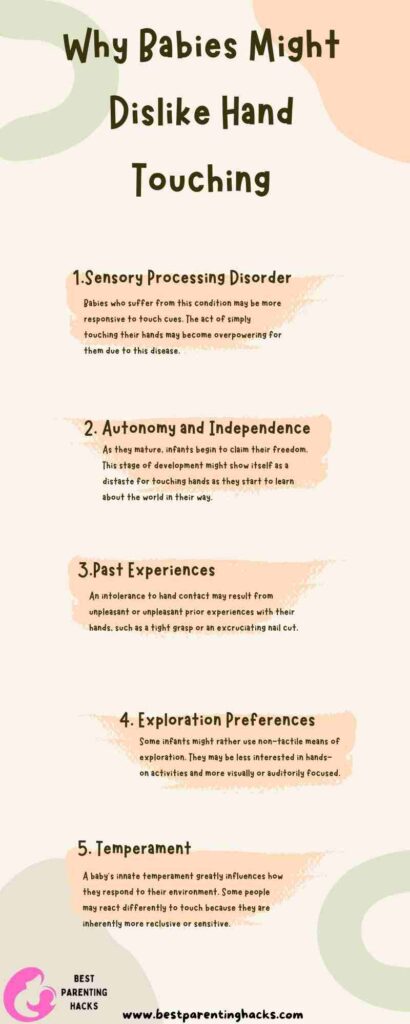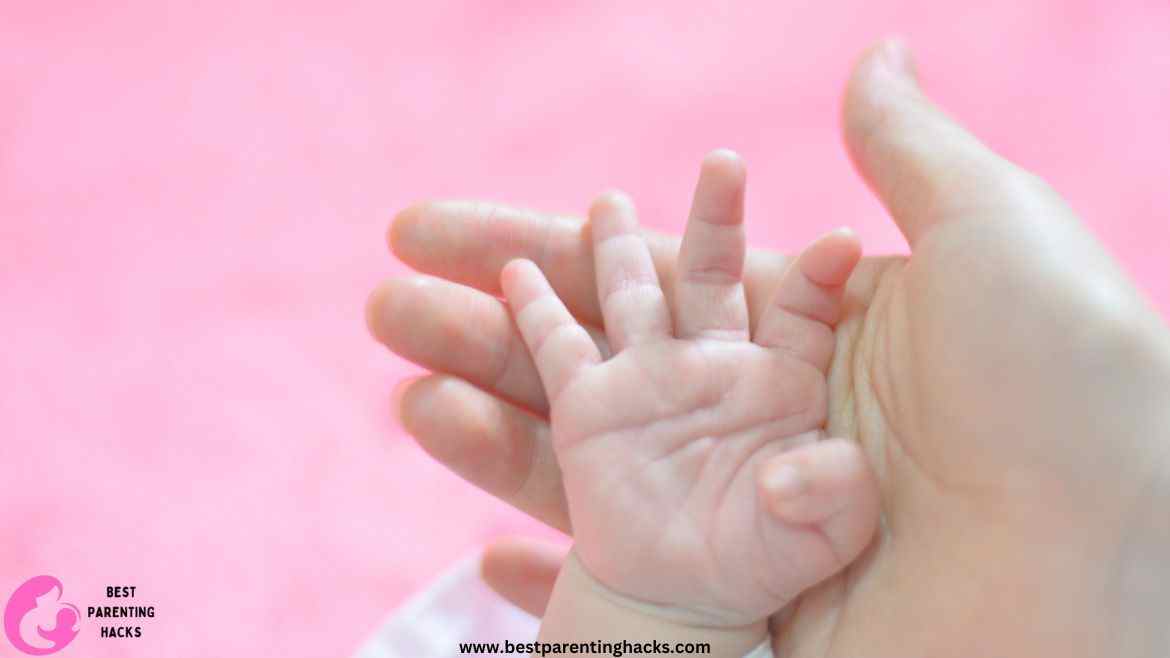Table of Contents
One of the most fascinating things about early childhood development that I’ve seen as a parent is how different newborns’ responses are to touch and other sensory experiences. while my child initially showed signals of discomfort while having their hands handled, I was intrigued and concerned at the same time. Particularly during lighthearted games like “pat-a-cake” or when I attempted to assist their small hands in grasping items, this response appeared strange. I couldn’t. Ponder on how babies explore the world using their senses and how their perception and response to touch differs from that of adults. This inquiry was not just about learning about my infant’s specific preferences, but also about tailoring my parenting approach to better fit their needs and level of comfort.
When it comes to the issue, “Why My Baby Doesn’t Like Hands Touched?” the complexity and individuality of a newborn’s sensory processing provide the answer, I found. Every newborn has a different way of experiencing the world due to their own temperament and developmental path. Some people find contact, especially when it comes to their hands, to be overpowering or uncomfortable, which causes them to engage in avoidance behaviors. This article explores several reasons why certain newborns may exhibit these aversions as well as practical ways for parents to recognize and address these sensitivities.

Common Reasons Why Babies Might Dislike Hand Touching
In trying to figure out why my kid flinched away from hand contact, I found that there are a few things that might cause this behavior. A baby’s response to hand contact can be influenced by several developmental, psychological, and environmental factors in addition to sensory processing.
1. Sensory Processing Disorder: Babies who suffer from this condition may be more responsive to touch cues. The act of simply touching their hands may become overpowering for them due to this disease.
2. Autonomy and Independence: As they mature, infants begin to claim their freedom. This stage of development might show itself as a distaste for touching hands as they start to learn about the world in their way.
3. Past Experiences: An intolerance to hand contact may result from unpleasant or unpleasant prior experiences with their hands, such as a tight grasp or an excruciating nail cut.
4. Exploration Preferences: Some infants might rather use non-tactile means of exploration. They may be less interested in hands-on activities and more visually or auditorily focused.
5. Temperament: A baby’s innate temperament greatly influences how they respond to their environment. Some people may react differently to touch because they are inherently more reclusive or sensitive.
You Might Also Like to Read: What To Do If My Baby Ate Potting Soil?

Understanding Babies’ Sensory Experiences
A baby’s environment is a kaleidoscope of senses, with touch playing a crucial part. A baby’s connection with the outside world is largely shaped by the sensory experiences they have, as I have discovered in my quest to understand my baby’s intolerance to hand contact. Every touch, whether it’s the softness of a blanket or the gentle caress of a breeze, aids in their sensory development. For some newborns, though, this sensory world may be quite overpowering. Because their neural systems are still developing, they could react to touch or other sensory stimuli differently or more powerfully than older kids or adults.
1. Sensory Sensitivity: Babies that are more sensitive to touch may experience more intensity from particular textures or forces. Because of this increased awareness, routine touch may seem awkward or even painful.
2. Sensory Overload: When an infant’s growing nervous system is overstimulated with sensory input, they may experience sensory overload. Withdrawing from touch as a coping strategy may result from this.
3. Preference for Certain Types of Touch: Infants may exhibit preferences for particular touch kinds, just like adults do. While some people can find gentle touches uncomfortable, others could respond better to harder, more secure touching.
4. Developmental Variations: The sensory system of each newborn grows at a different rate. Their response to touch and other sensory inputs may be affected by delays or discrepancies in this development.
You Might Also Like to Read: Why Does My Baby Scratch His Head While Sleeping?

Impact of Disliking Hand Touching on Development
I started worrying about my baby’s possible developmental consequences after noticing how reluctant they were to have their hands handled. The hands are essential instruments for investigation and education and aversion to touching the hands can have several effects.
1. Motor Skill Development: Using the hands is essential for the development of fine motor abilities. Skills like gripping, pointing, and clapping can be delayed by an aversion to hand contact.
2. Social Interaction: Activities using the hands, including games or waving, include hand contact. Avoidance may affect these opportunities for social learning.
3. Self-Feeding Skills: A baby’s independence and capacity to experiment with different food textures may be impacted by a reluctance to use their hands to feed themselves.
4. Sensory Integration: When exploring the senses, the hands are crucial. A baby’s ability to learn and integrate its senses may be hindered by an aversion to being touched by hands.
5. Emotional Development: Touching hands is another means of showing and receiving love. A baby’s ability to emotionally connect with people may be impacted by avoidance.

Strategies to Help Babies Who Dislike Hand Touching
I looked into several techniques to assist my infant get over their uneasiness when I touched them with my hands and learned to enjoy tactile stimuli.
1. Gradual Desensitization: A newborn can be made used to hand contact by introducing touch gradually, softly, and in a non-threatening manner.
2. Sensory Play: Using their hands, babies may learn to interact with a wider range of textures and feelings by participating in sensory play activities.
3. Respect Boundaries: It’s critical to refrain from pushing hand contact and to honor a baby’s boundaries. Over time, this regard aids in the development of touch comfort and trust.
4. Professional Guidance: Speaking with a doctor or occupational therapist can guarantee there are no underlying problems and offer customized techniques.
When to Seek Professional Advice
Although it’s normal for newborns to experience stages of dislike for particular sensations, there are instances in which seeking expert guidance is required.
1. Persistent Avoidance: Despite time and many approaches, if a baby continually refuses to touch his or her hands, there may be a more serious problem.
2. Developmental Delays: A professional assessment is necessary if the aversion to hand-touching is coupled with other developmental abnormalities.
3. Intense Reactions: Severe adverse responses to hand contact, such as acute anxiety or restlessness, call for medical assistance.
4. Impact on Daily Activities: It’s time to get help when a baby’s dislike of hand contact interferes with feeding or playing, among other everyday activities.
5. Parental Concern: It’s important to follow your instincts as a parent. A professional’s advice and peace of mind can be obtained if you’re worried about your baby’s resistance to hand contact.

Conclusion
A learning curve full of obstacles and revelations has been encountered when navigating a baby’s resistance to hand contact. As a parent, it has been crucial for me to acknowledge the intricacies of encounters and respect the needs of my child. I’ve learned the value of patience, empathy, and adaptation from this trip. As parents, it is our duty to support and guide our children as they go through the stages of development that every baby experiences. The methods and realizations discussed in this piece bear witness to the adventure my child and I have taken together. They show not just the difficulties we’ve encountered but also our successes and personal development. Parents in comparable circumstances should know that they are not alone. You can make your infant feel confident and comfortable navigating their sensory environment if you have the correct understanding, patience, and approach.
FAQs
1. Is a dislike of having your hands touched a symptom of anything more serious?
To some extent, sure. Seeking advice from a healthcare professional is recommended if it is combined with further developmental delays.
2. How can I train my infant to accept hand contact?
Sensory play and gradual exposure can be beneficial. Begin with quick, light touches and progressively increase your exposure.
3. Is it cause for concern if my child objects to having their hands touched?
Phases are a frequent occurrence for newborns. But it’s always advisable to see a pediatrician if you’re worried.
4. Can the growth of my baby be impacted by this aversion?
It can affect social skills and motor abilities, but newborns can overcome these obstacles with the correct techniques.
5. What is the duration required for a newborn to overcome this aversion?
It fluctuates. While some babies acclimate quickly, others require more time. Patience and consistency are essential.
6. Is it possible to engage my infant in activities that promote hand usage?
Interactive games, finger painting, and sensory bins can all promote hand usage.
7. When should I take my infant to a specialist to address their hand sensitivity?
It is best to consult a specialist if the aversion continues and is interfering with your baby’s growth or everyday activities.




